Words by Jenny Bertrand
Reading time: 12 minutes
When chaos or conflict sets in, the Humanitarian Principles guide our lifesaving emergency relief efforts to protect humans from suffering. Learn what they are and why we follow them.
Every human life is worth protecting. The Humanitarian Principles of humanity, impartiality, neutrality and independence, established decades ago, still form the foundation for humanitarian action. These principles, supported by international humanitarian law, guide UN agencies and local and international humanitarian organizations like us in supporting anyone, anywhere it’s needed.
“They underpin the work of humanitarians, providing standard principles to guide work from one context to another,” says Nadine Grant, VP of International Programs and Business Development at Plan International Canada.
Grant has 30 years of experience in international development, including long term assignments living and working in active conflict zones in Afghanistan, East Timor, Republic of Congo and other countries.
Origins
The United Nations General Assembly adopted the first three principles – humanity, impartiality and neutrality – in 1991 and the fourth – independence – in 2004.
However, the concept of providing neutral assistance dates to the mid-1800s, when the International Red Cross and Red Crescent Movement (the Red Cross) was founded, and its principles helped form the original Geneva Convention after the 1859 battle of Solferino in Italy. This first set of international humanitarian laws of war called on battling parties to respect medical personnel and allow military personnel to be cared for, no matter their side. After World War II, the Geneva Conventions expanded to protect civilians in conflicts. Nearly 200 countries have signed the treaty.
Since then, the principles have been adapted to meet changing needs and expanding mandates, such as supporting people affected by extreme weather events. The Red Cross Code of Conduct of 1994 outlines standards for disaster relief – which includes a commitment to following the Humanitarian Principles. Nearly 500 organizations, including Plan International, adhere to the Code of Conduct.
Saving Lives Without Taking Sides
How to help
Donate Now
Every human has the right to life, safety and peace. The principle of humanity forms the basis of the humanitarian imperative: that the global community should act unimpededly to prevent or alleviate human suffering caused by disasters or conflict. This principle comes first. Humanity transforms our collective empathy for one another into emergency assistance for whoever needs it most. It’s compassion in action, ranging from generous donations to brave rescue acts by neighbours, volunteers and local staff – all to reduce harm for anyone experiencing it.
“Our organization was born from the principle of humanity and wanting to support children who were affected or orphaned by the Spanish Civil War,” says Grant, referring to how Plan International was founded in 1937. “Humanity is part of our DNA”.
The Four Principles
Humanity
1

Adhering to the principle of impartiality involves acting without prejudice, bias or discrimination when supporting those impacted by a crisis or disaster. It means making objective assessments of people’s needs, recognizing that some people are at greater risk or have more significant needs due to their situation, age, gender, ability, etc. Think of impartiality like triage at a hospital: Experts assess needs, and care is given based on the urgency of conditions.
Impartiality
2

How we assess needs
To determine our first response in a crisis, we work with lwith local and international groups (and increasingly with young people) to help identify life-saving priorities, risks and capacities through a rapid needs assessment. Our in-area experts prepare response plans detailing the logistics, procurement, communications, security and advocacy requirements. We generally assess:
The affected area and if people are evacuating elsewhere
The specific effect on girls and women and other groups who are at high risk, like children separated from their parents
The damage to homes, schools and health facilities
The presence of shelter, health workers and teachers
The availability of food, markets and cash, and damage to agriculture
Access to clean water and sanitation
The effect on the power grid and communications
The effect on transportation, especially if airports, ports and roads are open
Neutrality
3

“It can be difficult to maintain a stance of neutrality, but it’s essential,” says Grant. Neutrality is how organizations can cross blockades to reach people in need. It helps emergency staff stay safe so they can continue their relief work instead of becoming targets or victims themselves.
The principles help ensure that humanitarian aid does not become a weapon or tool to be used by actors in armed conflicts.”
“
Remaining neutral enables organizations to provide support to communities based on need, not affiliation. The only side we take is the side of preserving human life above all else, including calling for ceasefires and supporting refugees, host communities and people displaced and affected on both sides of a conflict.
Humanitarian and non-governmental organizations (NGOs) often need to collaborate with government institutions and other donors and partners to carry out their work. But in humanitarian scenarios, operating independently enables a response based solely on need, with no strings attached.
Grant explains that “The independence principle provides an organization with a firm stance to not give in to politics, one-sided donations or a hostile news cycle at times when there can be enormous pressure from governments, media and the public to attend to particular groups or to get a particular message across.”
Independence
4

Crises are chaotic, fragile scenarios with so much on the line.
“They’re becoming more complex, protracted and devastating, with even more dire impacts on women and girls in conflict zones,” says Grant. The average humanitarian crisis lasts more than ten years and people become displaced for over 14 years. Taking the Humanitarian Principles off paper and into real-world disasters “helps humanitarian actors stay true to their missions while adopting a consistent set of standards irrespective of the unique geographies.”
Our mission is to create a just world that advances children’s rights and equality for girls. We prioritize children, especially girls, everywhere we work. To do that, we are guided by many international laws and policies, including commitments to gender equality; protection from sexual exploitation, abuse and harassment; and localizing aid.
“The Convention on the Rights of the Child is our North Star,” says Grant. It’s the most widely-ratified human-rights treaty, with nearly every nation’s signature. It states that childhood must be protected and that every child has the right to grow, learn, play and develop with dignity.
The Convention applies many of the same values as the Humanitarian Principles, with care and the right to life (humanity) and anti-discrimination (impartiality) at the core.
Crises infringe on children’s rights and cut childhoods short. We must act to the best of our ability to support children wherever they are oppressed, exploited, left behind or not equally valued.
Principles in practice
Why they matter – real world examples
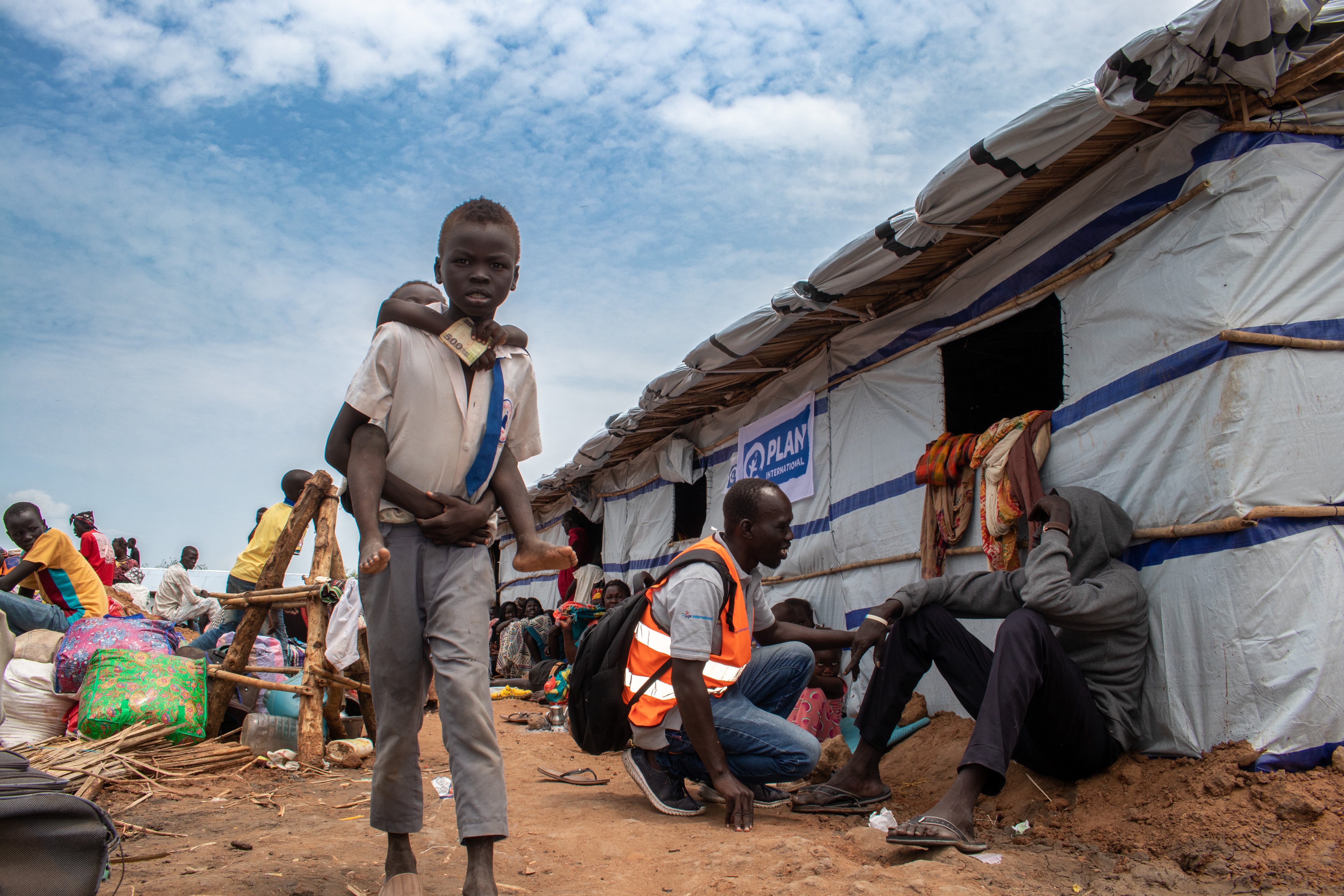
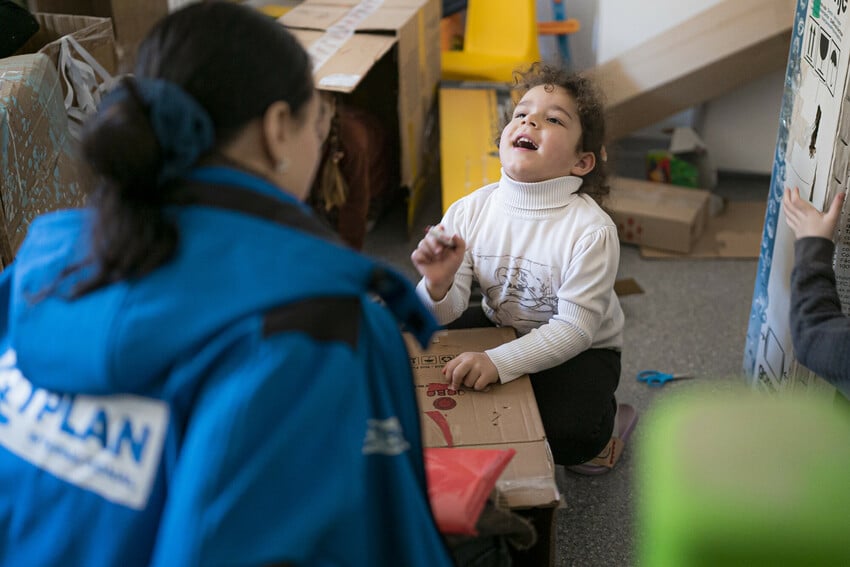
Four-year-old Veronica plays with a Plan International staff member at a day centre in Ukraine operating in place of a regular kindergarten.
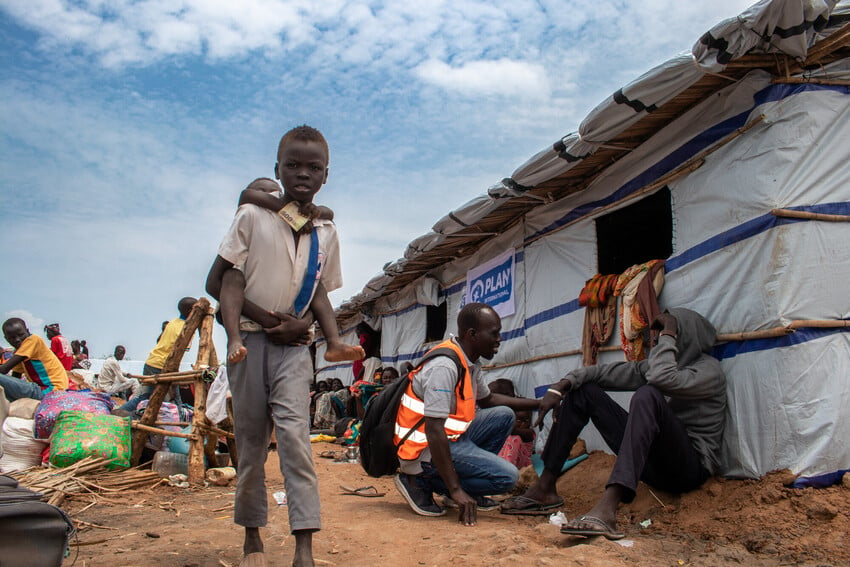
Plan International has set up shelters at the Sudan and South Sudan border for people fleeing conflict that escalated in 2023. We’re providing mosquito nets, soap and water treatment supplies.

Aries, a member of Plan International Philippines’ emergency response team, handed out water and hygiene kits to people affected by a typhoon in December 2021.
Children in Crisis Response Fund
Help our emergency teams respond quickly with lifesaving support in the next crisis, wherever and whenever one strikes.
Emergency Appeals
See some of Plan International’s current humanitarian appeals and be a part of our lifesaving efforts.
Give to the
Greatest Need
Give a gift that does it all: from urgent care to nutritious food and more for children in over 50 countries.
Donate Now
Donate Now
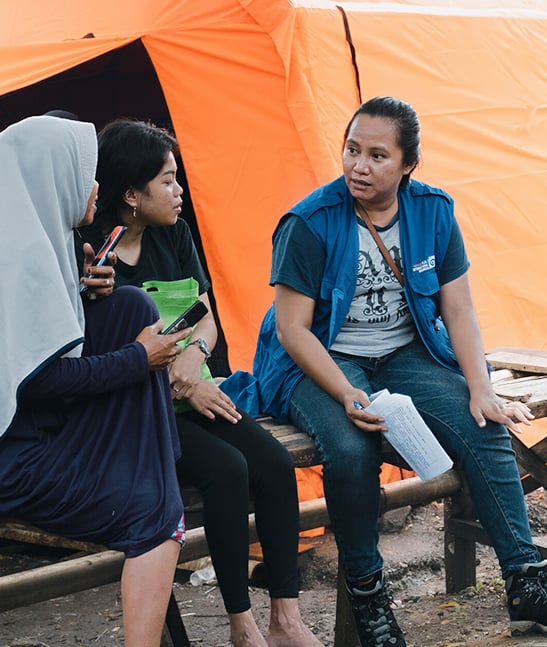
In November 2022, an earthquake in West Java, Indonesia, forced thousands of people into evacuation shelters like this one.
Impartiality in Burkina Faso
Plan International supports a care centre in Burkina Faso for children rescued from armed groups. There, children can learn, eat nutritious meals, play and begin their recovery journey.
Where we work in Burkina Faso and Niger, militant groups attack schools, especially where girls are students. “Being impartial doesn’t mean we turn a blind eye,” says Grant. “We bear witness when students and teachers have been murdered, or when schools have been burned down. We document these cases and report to local authorities, while at the same time report these to UN education authorities who track attacks on schools globally.”
Our impartiality means we support government-run schools, as well as informal schools in areas under the control of armed actors. We are there to provide psychosocial support and ensure continuity of education in remote areas.
offer case management to child survivors of violence and refer those in need to other social services.
distribute health kits stocked with menstrual products and soap.
provide food and solar-powered chargers for phones and other devices so women can stay safe in their communities.
Next
Independence in Haiti
Humanity in Syria



1/3

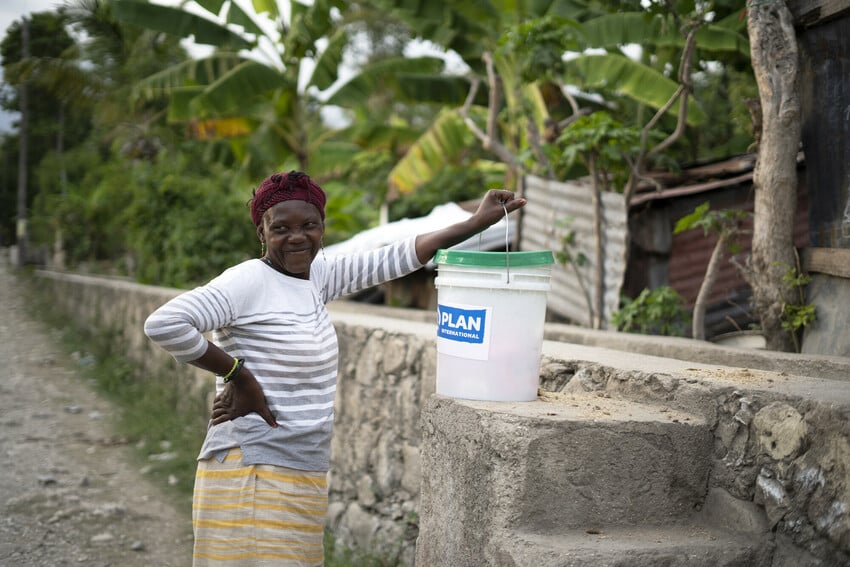
Plan International has distributed hygiene kits with water purification tablets to more than 1,000 households in Haiti.
We strive to bring attention and support to children in need, whether they’re in the headlines or not. This ideology is rooted in the principles of humanity, or the humanitarian imperative. Long, protracted crises – like droughts, hunger or political unrest – often fall off the cycle and lack international funding, so those in need get left behind.
That’s precisely what has happened in Haiti, which has been under a “red-alert” hunger crisis for almost two years. Nearly 8.2 million people, or 70% of the population, face food insecurity. Since June 2022, Plan International has distributed life-saving cash to nearly 25,000 people and has supported the Haitian-led emergency response.
Hunger is worsening around the world, especially in West Africa and the Horn of Africa. But people caught in this deadly crisis haven’t received the donations and government support they need. As an independent organization, Plan International has been sounding the alarm for years. In June 2023, we launched a campaign with a record-high 35x match for a school meal program in Sierra Leone, which provided nutritious lunches for nearly 300,000 children.
2/3
Next
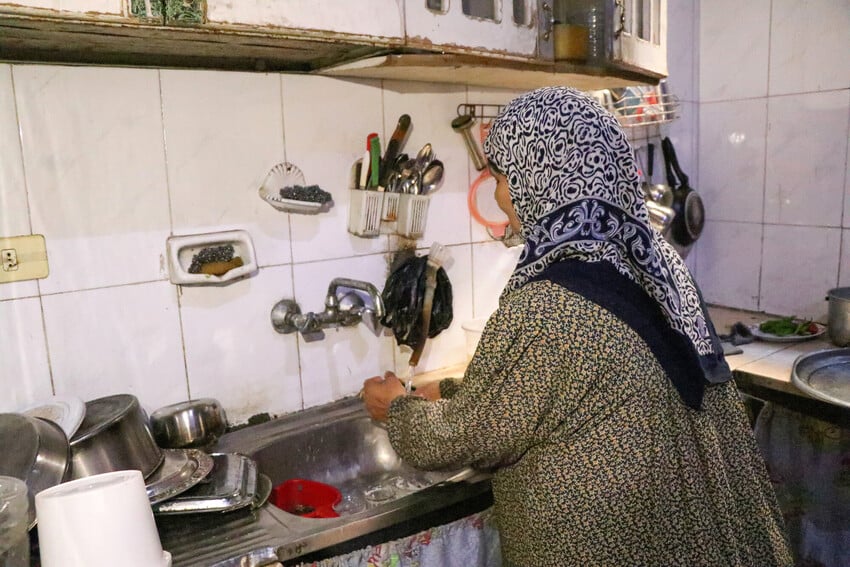
We helped return clean, running water to Shamsa’s home in Syria after the February 2023 earthquake
In Syria, children have grown up in a civil war, and many have become refugees. This year, they added “earthquake survivors” to that list.
“It was a terrible earthquake. Our response was guided by humanity and that everybody has a right to dignity,” says Grant. More than 10,000 buildings were damaged, and after the earthquake, the number of displaced people in the country rose to 6.8 million – a third of the population.
“Plan International and our local partners have been able to provide impartial assistance to those in need, irrespective of whether they’re in support of the government or non-state groups,” says Grant.
We rebuilt six clean water systems, reaching more than 106,000 people in Aleppo and Latakia, including 70-year-old Shamsa.
“During the restoration period, the team treated us with respect,” says Shamsa. “They ensured everyone’s safety, with warning signs everywhere.”
3/3
Next
Back
Back
Back
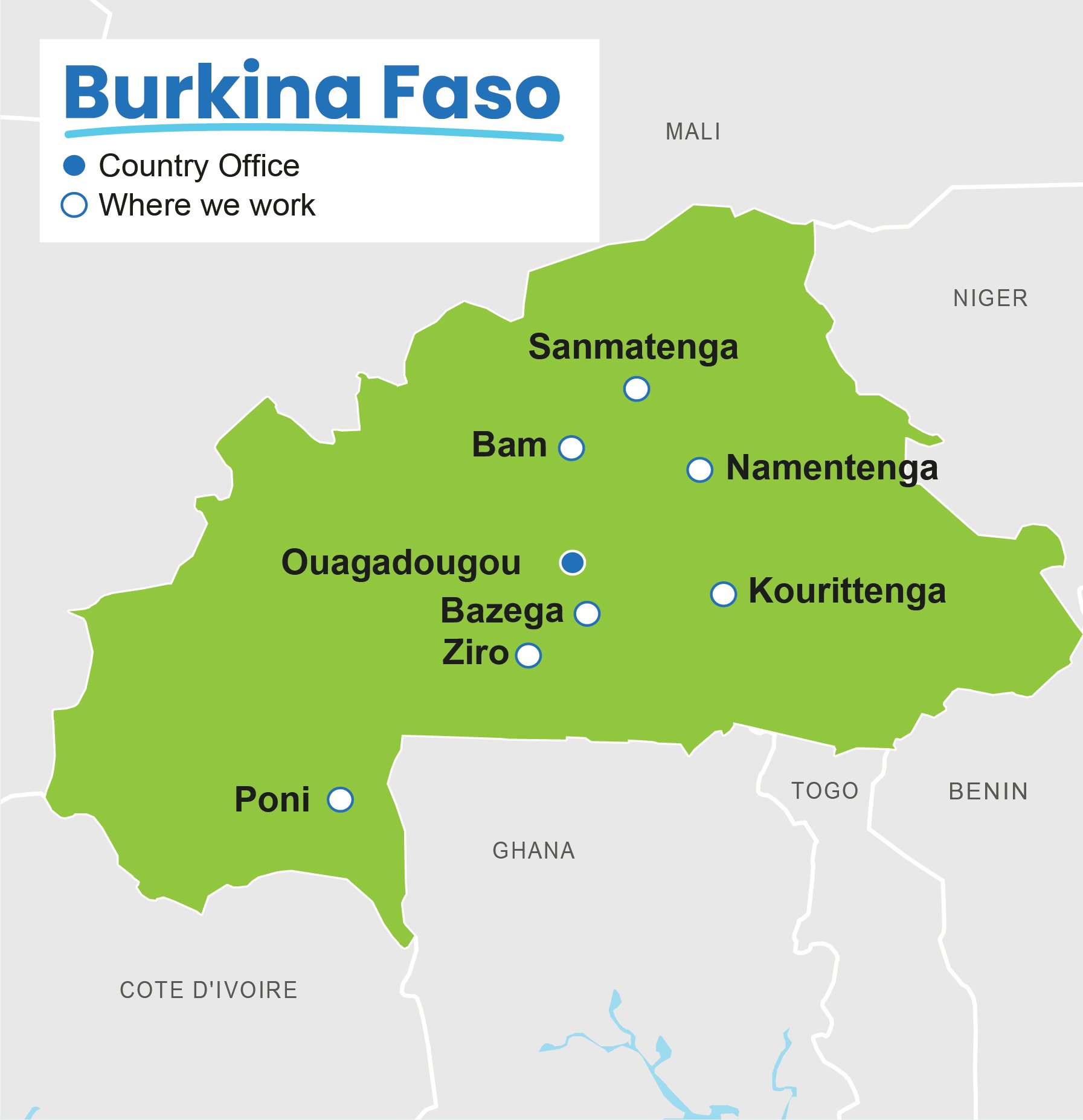
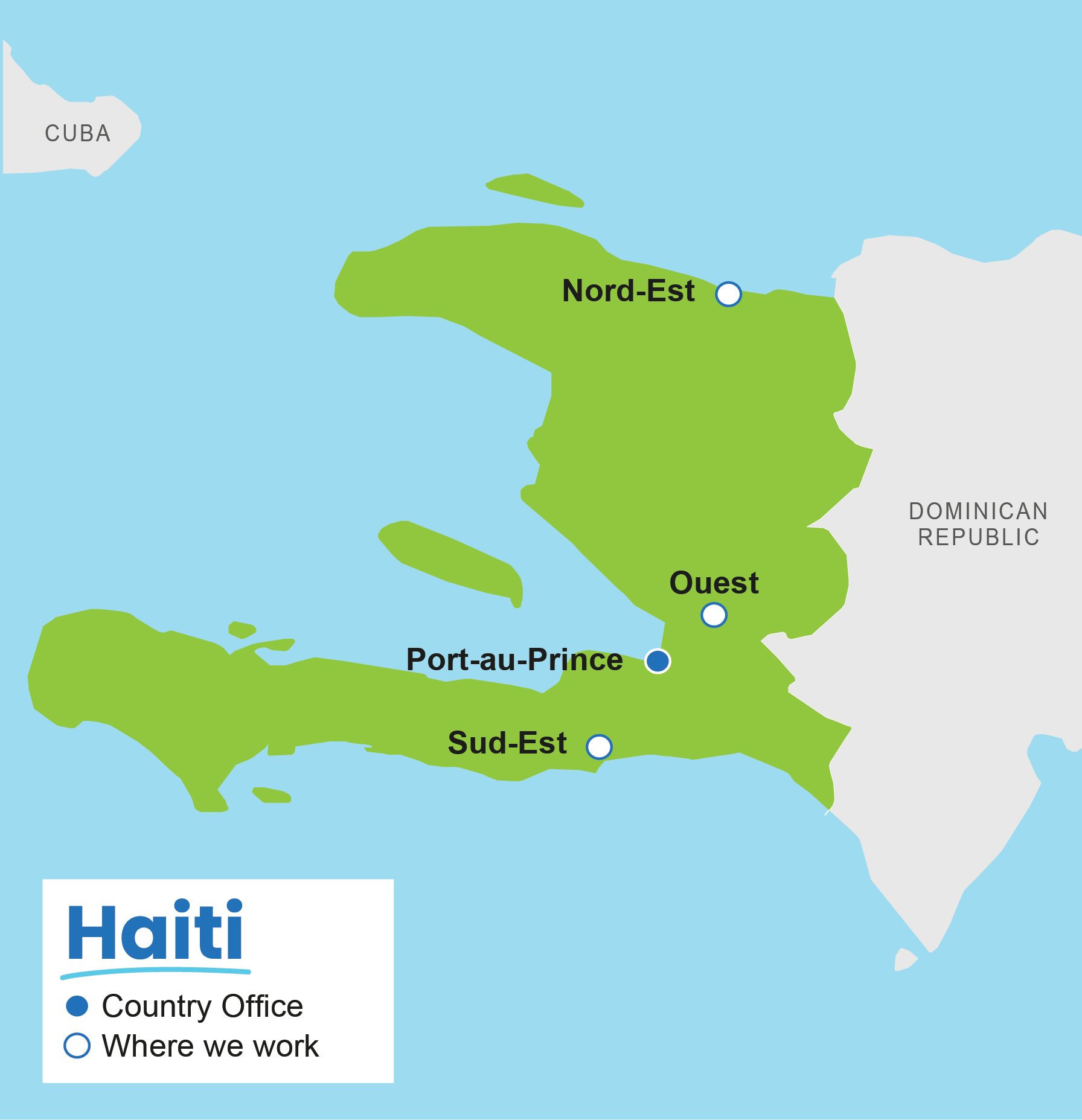
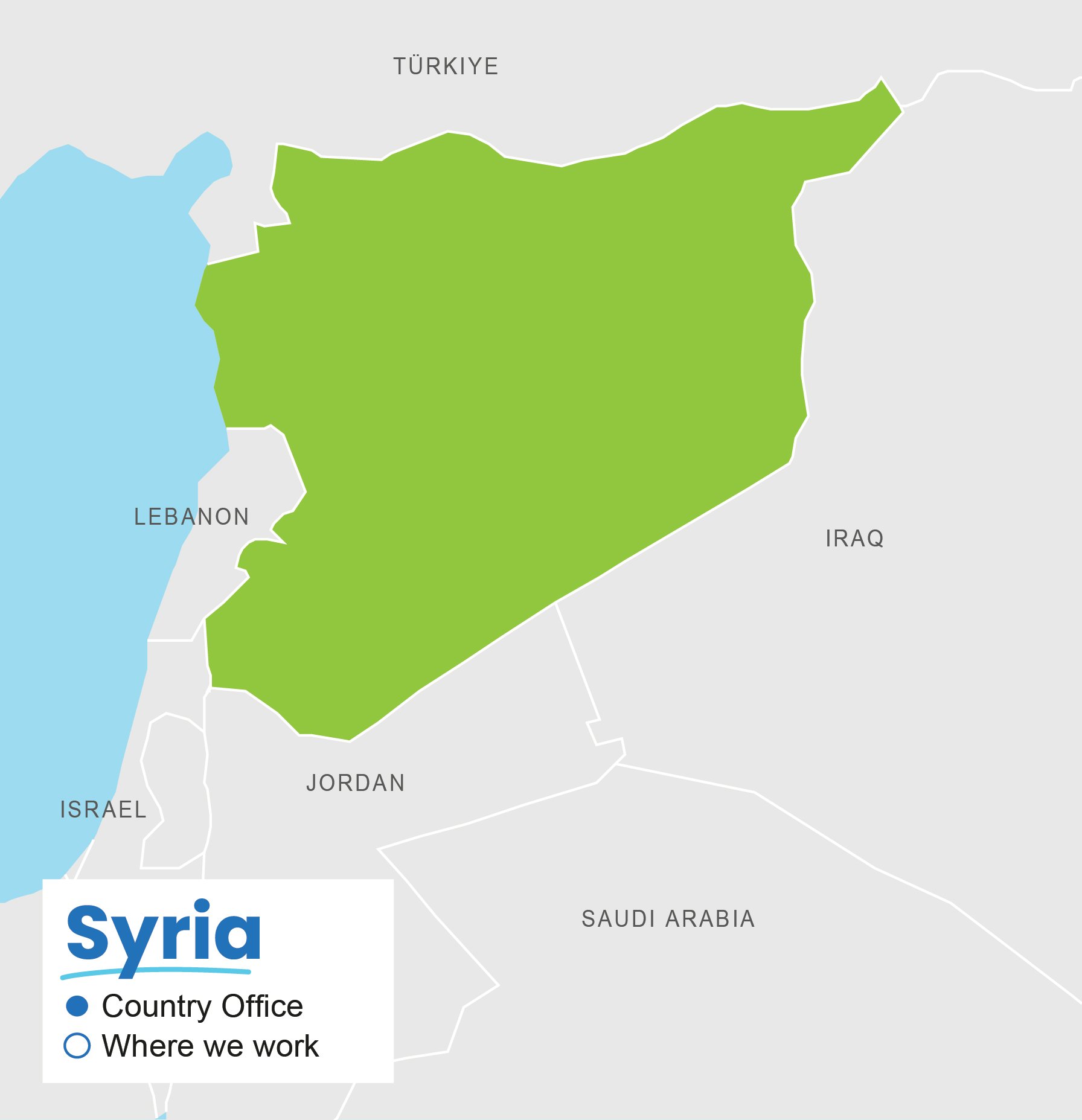


Why Humanitarian Principles Matter
– Nadine Grant
Plan International is helping:


You don’t need to be a humanitarian worker to believe in or follow the Humanitarian Principles. “There’s a universal quality to them,” says Grant. “They’ve been around in some sense for more than 150 years and are endorsed by the UN General Assembly, which represents almost every country.”
For those of us who want to help but don’t know how or where to channel our empathy or resources, the Humanitarian Principles can help. Grant says that you can ask yourself, ‘Am I making this donation based on need? Is this organization operating in an impartial manner?’
“With multiple, overlapping and complex crises that are lasting longer than before, that are under-resourced and have devasting impacts for women and girls, supporting transparent and accountable humanitarian actors is more important than ever,” says Grant. “If you intend to support principled emergency relief efforts, the Humanitarian Principles can guide your activism and financial support to those in need while keeping in line with your values, so you can feel good about doing good.”
The Humanitarian Principles and you
– Nadine Grant